Working Together for Racial and Social Justice: From Anti-Asian Racism and Violence to Anti-Racist Praxis in Geography
By Guo Chen, Associate Professor of Geography and Global Urban Studies, Michigan State University
This column is the first in a new section of the AAG News called Perspectives, which offers a platform for members to discuss issues of relevance to geography. A slightly longer version of this article was first published in April as a tie-in with related sessions sponsored by the Asian Geography Specialty Group and the China Geography Specialty Group at AAG’s annual meeting. Registered participants at the meeting may view the recordings of these sessions until May 11:
- Racism, Anti-racist Praxis, and COVID-19: A Conversation with AAAS President, Dr. Jennifer Ho
- Global Perspectives on Migration, Immigration, Race, Ethnicity, and Justice
In June 2020, the Association for Asian American Studies (AAAS) issued an open call directed at putting an immediate end to anti-Black racism and advancing efforts toward global social justice. The murders of Ahmaud Arbery, Breonna Taylor, Tony McDade, and George Floyd pulled a painful trigger for many Asian Americans. The Association clearly stated that “[the] fight against anti-Asian pandemic racism is rooted in a common struggle against white supremacy” and “[to] end global anti-Black racism, we must fight racism in our local communities and educate ourselves and others about the rich history of Black Americans and support, validate, and value Black lives now and always.”
Most recently, but not for the first time, the urgency of this shared struggle against white supremacy was highlighted by the horrific Atlanta-area shootings of eight people on March 16, 2021, including six women of Asian descent. In April, four members of the Indianapolis Sikh community were killed in a shooting at a FedEx warehouse. Anti-Asian racism in the United States has been more widely reported by the media lately than before (see LA Times coverage and NY Times, for example), and reports of anti-Asian hate crimes are rising around the world (see Time). In early 2020, Asian American communities and scholars were already well aware of this rise in anti-Asian racism. On a virtual panel in June 2020, the president of the AAAS, Dr. Jennifer Ho of the University of Colorado Boulder, explained why COVID-19-related anti-Chinese sentiment is essentially anti-Asian racism:
“[w]hile China and Chinese people have been targeted and blamed for the coronavirus in the United States … the truth is all forms of racism against the Chinese in the United States are forms of racism against anyone who is perceived to be Chinese in the United States. It’s an Asian/Asian American issue … what it means to be an Asian American is the recognition that those particularities that happened in a natal homeland get diminished, get flattened when you arrive in the United States. Because someone who doesn’t know what your particular ethnicity is, your nationality, and only sees your Asian-looking face and is going to make certain assumptions of who you are, about your ability to speak English … one of the things we have in common, as Asian Americans, is this understanding that we are not benefiting from white privilege, that we have been on a receiving end of systemic racism, starting with the Chinese, extending into other Asian ethnic groups.”
Since January 2020, the lives of Asian-heritage people in the U.S. and probably also in many other countries have been violently shaken. Asian Americans were among the first to help local communities combat COVID-19, while racist attacks were increasing in cities like Los Angeles. The Stop AAPI Hate website received 3,795 reports of anti-Asian hate incidents nationwide between its launch on March 19, 2020, and February 28, 2021. In these reports, the Chinese were the ethnic group most targeted, but 60% of the respondents were non-Chinese. Incidents occurred in all 50 states and the District of Columbia. Asian women reported significantly more incidents than did Asian men. The fatality rate for Asian women has continued to increase due to the combined effect of COVID-19 and a terrifying rise in hate incidents. In fact, the AAPI Data website reports that 13,620 more Asian Americans died than usual in the first seven months of 2020 (a 35% increase over the prior 5-year average). Over this long year, anxiety has also built up as many have been separated from their families or extended families and ancestral lands due to travel bans from both sides of the Pacific—a circumstance that has likely caused more stress to Asian women than to men, given that women are more likely to fulfill caregiver roles. As early as July 2020, studies were already finding a large percentage (40.3%) of Asian Americans with self-reported symptoms of anxiety and/or depression (an 8-fold jump from the previous year) compounded by racism-related vigilance. These same studies warned of the serious and long-lasting negative impact of experienced and perceived racial discrimination on physical health and psychological well-being.
Despite discussions on the xenophobic sentiment stoked by the previous U.S. administration, we must also accept the historicity of our current crisis of racism and racial violence. As race scholars have commented, white supremacy is the root of all race-related violence in the U.S., and “race is a thread that connects all shootings.” Anti-Asian racism is racism, just like anti-Black racism and any other form of racism. Whenever an Asian country is perceived as a national threat, Asian Americans suffer. Asian Americans are all too familiar with the history of state-sanctioned discrimination.
Racism is like a river that affects everyone in the country, and it is deeply rooted in white supremacy in the U.S.
. . .
We have come to realize that our geographic scholarship is compartmentalized along national, experiential, and personal identity lines. Racialized identities and the angst and alterity experienced by diasporic scholars in North America often need some translation to the rest of our international colleagues. But the themes of our studies are universal. As one geographer wrote to me, “different forms of oppression are linked … nobody is free until all are free.” And, as a community of geographers, we need to continue our discipline’s strong tradition of studying how oppression and marginalization play out, within places and across space. As a former chair of a Specialty Group of the AAG, I have led open dialogues with Asian and China-heritage geographers, some of whom shared opinions and stories with me in June 2020. Most expressed pain arising from frustration with a cross comparison of the ways different nations had handled COVID-19, together with feelings including fear about the prospect of leaving their “anodyne” research areas to embrace a perceived “politicized” arena, such as addressing the legacy of anti-Asian racism and distant or near memories of being discriminated against or marginalized as a Chinese or Asian scholar within our institutions. I appreciate their sharing with me.
“[T]here is a rising anti-Asian sentiment because of the [previous] U.S. leader’s rhetoric and the hawkish advisors and media he listens to … it is easier to blame the Other, versus looking clearly at the fault of not acting early, to respond to the pandemic, and doing the necessary steps to have masks, etc. We can see the … examples of Taiwan, South Korea, New Zealand and even many African nations that have low infection rates, and VERY low fatalities [by June 2020 during the first wave] … I get emotional almost weekly because of the current situation … I will stop writing about this.”
“I’m not a China-study scholar and I was never an active member as I almost never went to those AAG happy hours. But I do care about the study subjects … I used to think politics and politicization should be separate from academic endeavors, however, it becomes increasingly difficult, if not possible at all, to be like that. And even further, being a social scientist, I started asking myself whether it’s responsible not to face the challenges from the political side. I guess it’s a learning process for me.”
“I grew up in post-colonial Africa and have a very low level of tolerance for racism in any form. Even if I am not genetically Asian, I too could say a few words on bigotry and prejudices. But is this enough? Should we try to publish our personal opinions if this helps us discover our own identity and the originality of our own contributions as transnational geographers? We are a tiny minority but maybe it is easier for us to articulate or advocate than it is for a vast majority of people.”
“[One can] in no way ignore the anti-Asian/Chinese racism and discrimination that exist around the world, not just in the US … the diasporic Chinese scholars’ life experience …matter, and … the research on Asian (im)migration and racism … matter.”
“As a Mainlander based in Hong Kong, I can totally relate to [the] feeling … [about] racial prejudices against Asian scholars.”
“[I] would like to reach out to say that I feel [I am] being discriminated [against] in my job.”
In 2021, these messages from nine months ago look so distant, but the concerns are even more relevant today. As we sojourned in the Zoom world of scholarly exchanges in the past year, the fluidity has afforded us connectedness and made us academic refugees striving for existential relevance. The interruption of COVID-19 in our customary lives also provides an opportunity to change. It is time to prioritize anti-racist praxis in Geography, like in other disciplines, and to ensure that our being anti-racist advances a resolution to “challenge structural racism and other intersecting oppressive systems—e.g., ableism, classism, ethnocentrism, homophobia, sexism, transphobia—by shifting power—e.g., funding and other critical resources, policies, processes, leadership, culture” in our discipline and subdisciplines. For area geographers (those whose research has been largely framed regionally rather than systematically or globally), some clear goals are to continue to interrogate the assumptions and privileges embedded in area-bound expertise, to continue to problematize our positionalities and the dominant narratives in our research field, and to continue to privilege the scholarship that has long been considered “marginal,” such as work on transnational migration and migrants, underprivileged people, race, ethnicity, and social justice, to name a few. There is also an urgency to develop anti-racist learning and teaching praxis in our discipline.
Many challenges are ahead, but the most dreadful time is when we are in silence. We should continue to intervene with dialogues to break this silence. The research field is there to be defined and redefined.
. . .
Guo Chen (PhD, Penn State), Associate Professor of Geography and Global Urban Studies at Michigan State University. She is the recipient of a Wilson Center Fellowship in 2017-2018 and an Outstanding Service Award from the China Geography Specialty Group of the AAG in 2020. At MSU, Guo serves as an elected faculty representative on the Asian Studies Advisory Council, a founding member of the Geo Diversity Committee, a newly appointed faculty member on the President’s Advisory Committee on Disability Issues, a SWIG faculty advisor and a core faculty member of the Asian Pacific American Studies Program beginning fall 2021. Guo thanks Christian Lentz, Ken Foote, Shaolu Yu, Jennifer Ho, and Lisa Schamess for their reading of this piece, and the many anonymous colleagues for their emails, warm words, and generously shared resources, which led to this op-ed. The opinions expressed here are solely her own.
DOI: 10.14433/2017.0089
Panel resources:
Ho, J. 2020. Anti-Asian racism, Black Lives Matter, and COVID-19. Japan Forum. https://www.tandfonline.com/doi/full/10.1080/09555803.2020.1821749 .
Japan Forum Podcast 8 With Prof Jennifer Ho – Anti-Asian Racism, BLM, and COVID-19. https://soundcloud.com/soas-university-of-london/japan-forum-podcast-8-with-prof-jennifer-ho-anti-asian-racism-blm-and-covid-19 .
Teaching resources for Anti-Asian racism and COVID-19. www.colorado.edu/asmagazine/2020/04/08/anti-asian-racism-and-covid-19.
To be an Asian woman in America. CNN opinion.
For an understanding of white supremacy as the root of all race-related violence in the US, read https://theconversation.com/white-supremacy-is-the-root-of-all-race-related-violence-in-the-us-157566
Read Ben Barron (PhD student in Geography at CU Boulder) article about the Boulder and Atlanta shootings: https://www.boulderweekly.com/opinion/guest-columns/race-is-a-thread-that-connects-all-mass-shootings/
Anti-Racism Resources for Asian Americans. https://tiny.cc/AntiRacistAsAmResources .
Alberts, Heike C. and Helen D. Hazen. 2013. International Students and Scholars in the United States: Coming from Abroad. New York: Palgrave Macmillan.
Please note: Perspectives is a new column intended to give AAG members an opportunity to share ideas relevant to the practice of geography. If you have an idea for a Perspective, see our guidelines for more information.



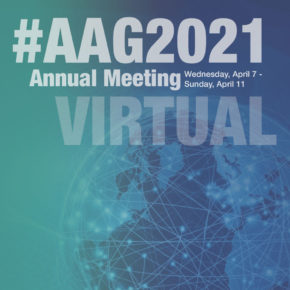 We are about 3 weeks away from the Annual Meeting! The completely virtual 2021 Annual Meeting, April 7-11, will feature 800+ paper sessions and panels on a wide range of topics as well as 27 poster sessions. Browse the
We are about 3 weeks away from the Annual Meeting! The completely virtual 2021 Annual Meeting, April 7-11, will feature 800+ paper sessions and panels on a wide range of topics as well as 27 poster sessions. Browse the 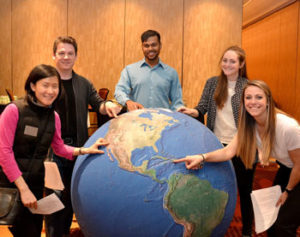
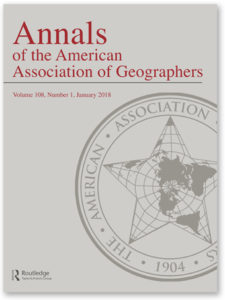 The most recent issue of the Annals of the AAG has been published online (
The most recent issue of the Annals of the AAG has been published online (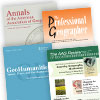 In addition to the most recently published journal, read the latest issue of the other AAG journals online:
In addition to the most recently published journal, read the latest issue of the other AAG journals online: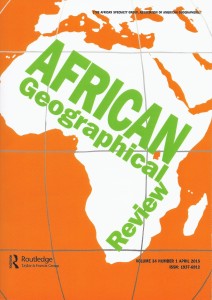
 The 2023 Special Issue of the Annals invites new and emerging geographic scholarship situated at the crossroads of Race, Nature, and the Environment. In seeking contributions from across the discipline, we welcome submissions that advance critical geographic thinking about race and the environment from diverse perspectives and locations; that utilize a broad array of geographic data, theories, and methods; and that cultivate geographic insights that cut across time, place, and space. Abstracts of no more than 250 words should be submitted by e-mail to
The 2023 Special Issue of the Annals invites new and emerging geographic scholarship situated at the crossroads of Race, Nature, and the Environment. In seeking contributions from across the discipline, we welcome submissions that advance critical geographic thinking about race and the environment from diverse perspectives and locations; that utilize a broad array of geographic data, theories, and methods; and that cultivate geographic insights that cut across time, place, and space. Abstracts of no more than 250 words should be submitted by e-mail to 

 The AAG is pleased to announce the recipients of the three 2020 AAG Book Awards: the John Brinckerhoff Jackson Prize, the AAG Globe Book Award for Public Understanding of Geography, and the AAG Meridian Book Award for Outstanding Scholarly Work in Geography. The AAG Book Awards mark distinguished and outstanding works published by geography authors during the previous year, 2020. The AAG will confer these awards at a future event to be determined, once the travel and in-person meeting restrictions have been lifted.
The AAG is pleased to announce the recipients of the three 2020 AAG Book Awards: the John Brinckerhoff Jackson Prize, the AAG Globe Book Award for Public Understanding of Geography, and the AAG Meridian Book Award for Outstanding Scholarly Work in Geography. The AAG Book Awards mark distinguished and outstanding works published by geography authors during the previous year, 2020. The AAG will confer these awards at a future event to be determined, once the travel and in-person meeting restrictions have been lifted.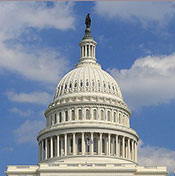
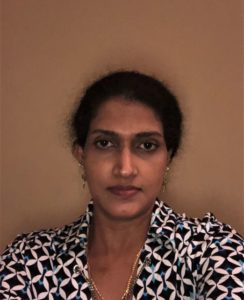
 Two virtual events are upcoming that may be of interest to AAG members:
Two virtual events are upcoming that may be of interest to AAG members: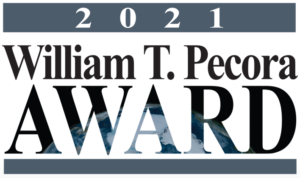 The William T. Pecora Award is presented annually to individuals or teams using satellite or aerial remote sensing that make outstanding contributions toward understanding the Earth (land, oceans and air), educating the next generation of scientists, informing decision makers or supporting natural or human-induced disaster response. Sponsored jointly by the Department of the Interior (DOI) and the National Aeronautics and Space Administration (NASA) and established in 1974, the award honors the memory of Dr. William T. Pecora, former Director of the U.S. Geological Survey and Under Secretary, Department of the Interior, whose early vision and support helped establish the Landsat satellite program. Nominations for the 2021 awards must be received by the Award Committee by May 14, 2021.
The William T. Pecora Award is presented annually to individuals or teams using satellite or aerial remote sensing that make outstanding contributions toward understanding the Earth (land, oceans and air), educating the next generation of scientists, informing decision makers or supporting natural or human-induced disaster response. Sponsored jointly by the Department of the Interior (DOI) and the National Aeronautics and Space Administration (NASA) and established in 1974, the award honors the memory of Dr. William T. Pecora, former Director of the U.S. Geological Survey and Under Secretary, Department of the Interior, whose early vision and support helped establish the Landsat satellite program. Nominations for the 2021 awards must be received by the Award Committee by May 14, 2021.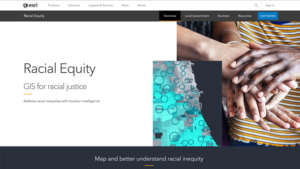
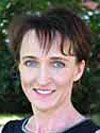 “You Baby.” It’s Saturday morning. Jeffrey, who is chronologically well out of his early teenage years, but very much still there in spirit, is awake and calling to me with his favorite insult. He’s mostly non-verbal, but this particular phrase is one that he articulates well enough for anyone to understand.
“You Baby.” It’s Saturday morning. Jeffrey, who is chronologically well out of his early teenage years, but very much still there in spirit, is awake and calling to me with his favorite insult. He’s mostly non-verbal, but this particular phrase is one that he articulates well enough for anyone to understand.
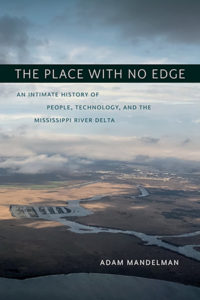 Adam Mandelman, The Place with No Edge: An Intimate History of People, Technology, and the Mississippi River Delta (LSU Press, 2020)
Adam Mandelman, The Place with No Edge: An Intimate History of People, Technology, and the Mississippi River Delta (LSU Press, 2020)
